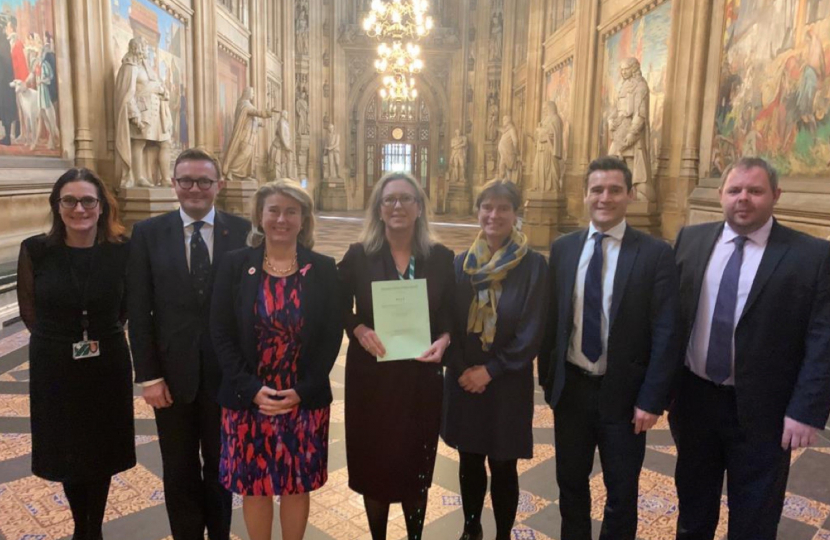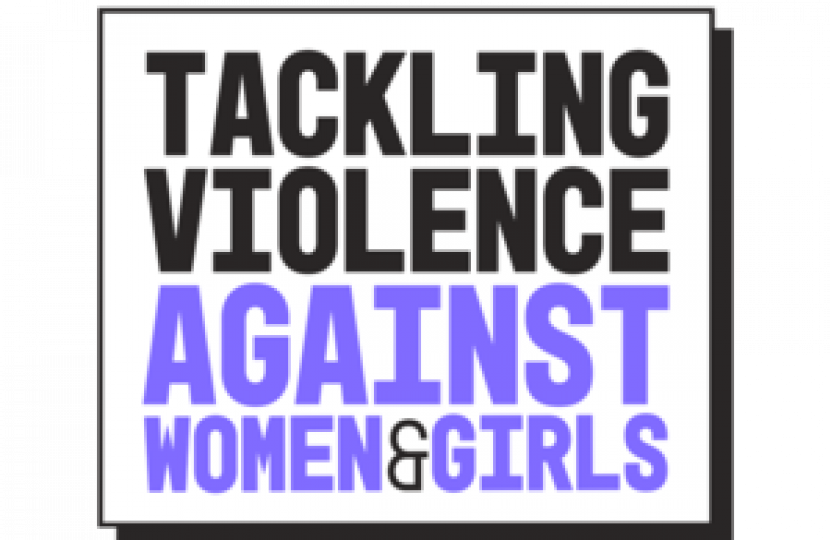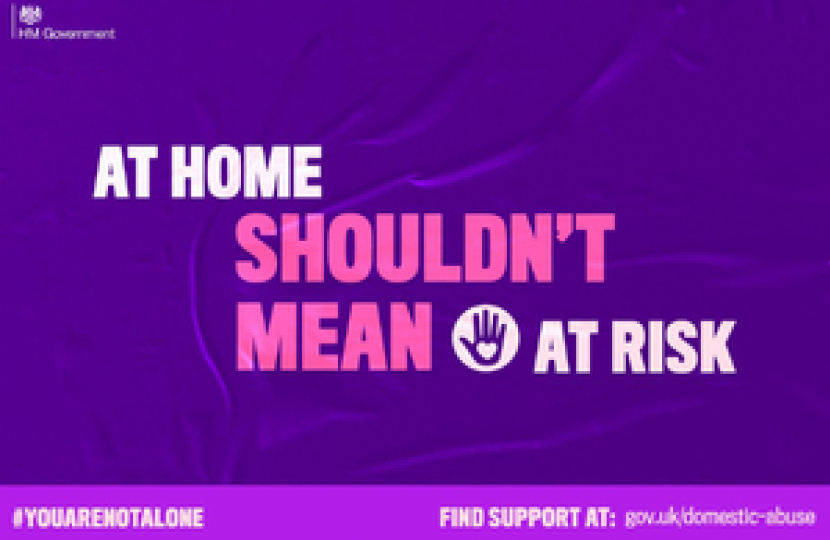Due to the actions of this Conservative Government we now have truly world-leading legislation on the statute book to tackle domestic abuse and violence against women and girls. Rebecca has supported all the measures that have been brought forward.
DOMESTIC ABUSE ACT 2021
In 2021, Rebecca was the Whip in charge of making sure the Domestic Abuse Act was passed into law and during this she heard directly from survivors, charities and women’s groups about the horrors they faced or continue to see. Rebecca considers it one of her proudest achievements to have guided it through Parliament.
The Act:
- Creates a statutory definition of domestic abuse, emphasising that domestic abuse is not just physical violence, but also emotional, controlling or coercive, and economic abuse.
- Establishes in law the office of Domestic Abuse Commissioner and set out the Commissioner’s functions and powers. The office is currently held by Nicole Jacobs.
- Places a duty on local authorities in England to provide accommodation-based support to victims of domestic abuse and their children in refuges and other safe accommodation.
- Creates a statutory presumption that victims of domestic abuse are eligible for special measures in the criminal, civil and family courts.
- Extends the offence of disclosing private sexual photographs and films with intent to cause distress (known as the “revenge porn” offence) to cover threats to disclose such material.
- Creates a new offence of non-fatal strangulation or suffocation of another person.
- Enables domestic abuse offenders to be subject to polygraph testing as a condition of their licence following their release from custody.
- Places the guidance supporting the Domestic Violence Disclosure Scheme (“Clare’s law”) on a statutory footing.
- Provides that all eligible homeless victims of domestic abuse automatically have ‘priority need’ for homelessness assistance.
DOMESTIC ABUSE PROTECTION ORDERS & NOTICES
The Act introduces a new civil Domestic Abuse Protection Notice to provide immediate protection following a domestic abuse incident, and a new civil Domestic Abuse Protection Order to provide flexible, longer-term protection for victims.
Protection Notices will provide immediate protection following an incident and the Orders will focus on longer term protections including compulsory attendance for perpetrator behaviour change programmes, electronic monitoring and mandatory disclosures of perpetrator name and address changes. These will be piloted in areas across the country from June 2024.
TACKLING VIOLENCE AGAINST WOMEN AND GIRLS
In December 2020, the Home Secretary opened a Call for Evidence to hear directly from the public on tackling violence against women and girls. Following the national outpouring of grief as a result of the tragic case of Sarah Everard, it was re-opened and received more than 180,000 responses. This was unprecedented and made for essential but grim reading. As a result, more than £500 million has been invested into the Tackling Violence Against Women and Girls Strategy in July 2021 and the complementary Tackling Domestic Abuse Plan in March 2022.
IDVAs & ISVAs
This Government is providing strong protections for victims. By 2025 funding for victim support services will have quadrupled compared to 2010, with the expansion of Independent Sexual Violence Advisors (ISVAs) and Independent Domestic Violence Advisors (IDVAs). This additional funding will mean the number of IDVAs and IDSAs posts increases by 300, to over 1,000, by 2024/25.
These individuals have a significant role in providing high-risk victims of domestic abuse with a tailored and person-centred safety and support plan so that victims and their families are protected from abusive behaviour. This includes risk assessment, safety planning, advocacy, emotional support and empowerment. We know that when victims are supported by them, they are nearly 50% more likely to stay engaged in the system, which helps enable justice to be delivered.
The Victims and Prisoners Bill introduces new statutory guidance for these roles that will include a deliberately broad definition of ISVAs and IDVAs and will place a duty on them to have regard to the statutory guidance.
VICTIMS AND PRISONERS BILL
The Victims and Prisoners Bill is also progressing through Parliament which Rebecca is supporting, delivering another manifesto commitment.
- Placing the overarching principles of the Victims’ Code into primary legislation, to send a clear signal about what victims of crime can and should expect from the criminal justice system.
- Placing a duty on relevant bodies to promote awareness of the Victims’ Code so that victims are aware of and understand their entitlements both before victims choose to report a crime, and throughout the victim’s journey in the criminal justice system.
This legislation will reform the parole system to better protect the public and ensure those behind bars with a whole life order are barred from marriage. Many are wrongly not offered the opportunity of making a Victim Personal Statement and many feel ill-informed by the police and justice system. Therefore, the Bill will place a duty on both to collect data on their compliance with the code, of which this is part, and introduce regulations to standardise this so local areas are clear what they should be doing, where they aren’t and outline how to improve it.
It will also allow victims to have the right to a face-to-face meeting with the prosecution team in the face of a ‘not guilty’ plea by the perpetrator to ensure they are fully aware of the process ahead of them and allow victims to feel far more at ease and ask any questions or voice concerns they may have. This will include outlining the possibility of providing video evidence. The Government has changed the law so that rape victims can pre-record their evidence which is available nationwide and that domestic violence victims are spared from being cross-examined by their perpetrator.
LEGAL AID REFORMS
The Government is ensuring legal aid is available to all that need it. The income and capital thresholds are being raised meaning 3.5 million more people will be eligible for support in the magistrate courts and 2.5 million more through the civil court system. Specific changes also mean that barristers are able to be paid to provide their clients with the option of pre-recorded evidence, with the numbers using this method expected to treble because of this change. Of course, this will mean the courts need to be capable of facilitating this which is why the £1.3 billion court modernisation programme has been progressing to allow for the greater use of modern technology in our courtrooms.
SAFETY OF WOMEN AT NIGHT FUND & SAFER STREETS FUND
Since the Safer Streets Fund launched in 2020, the Government has invested £185 million through five rounds of the Safer Streets Fund and the Safety of Women at Night Fund across England and Wales. The funding will go towards the rollout of additional CCTV, street lighting, alleygating and improving the security of properties at risk of neighbourhood crime for burglary hotspot areas and remote locations and on the night-time economy and working with local businesses to keep women safe and raise awareness of violence against women and girls in local pubs and bars.
CRIMINAL JUSTICE BILL
The Criminal Justice Bill includes provisions which will mean offenders with a conviction of controlling or coercive behaviour sentenced to longer than 12 months will be automatically eligible for collaborative management by the police, probation and prison services, who will have a legal duty to manage the threat of the individuals involved.
SENTENCING BILL
The new Sentencing Bill which will create a new duty to impose Whole Life Orders, a sentence meaning an individual will never be eligible for parole, on the most heinous crimes and add murder involving sexual or sadistic conflict to this list to ensure that life means life.
PRIVATE MEMBERS’ LEGISLATION
Most recently, as the Private Members Bill Whip, Rebecca has been pleased to assist the passage of the Child Support Collection (Domestic Abuse) Act 2023 which will mean extra protections are now put in place meaning the CMS will be able to intervene in cases where abuse is evident using its power to collect and make payments, avoiding any need to contact the perpetrator involved.
She also supported the Protection from Sex-based Harassment in Public Act. The Act creates tougher sentencing for offenders that harass, alarm or cause distress due to the perceived sex of the victim-survivor so that it carries a maximum prison sentence of 2-years for the offence of public harassment.
FURTHER PLANNED MEASURES
- Adding those convicted of coercive or controlling behaviour to the Violence and Sex Offender Register.
- Adding violence against women and girls to the Strategic Policing Requirement, placing violence against women and girls on the same footing as serious organised crime and child sexual abuse.
- Expanding the hugely successful ‘Ask for ANI’ scheme
- Expanding the Disclosure Scheme for information on a partner and any previous offences they may have so that this is available within 28 days than the current 35.



